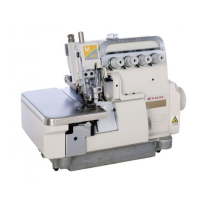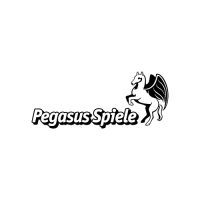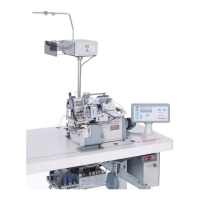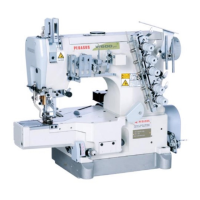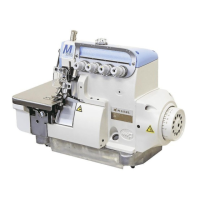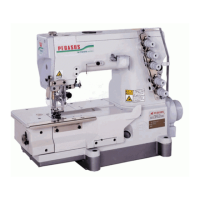Do you have a question about the Pegasus E52 series and is the answer not in the manual?
Information for machine operators, covering features for easier handling and increased production.
Notes for mechanics on machine maintenance, adjustment, and repair.
Specifies that this booklet covers machines manufactured from February 1980 (number 7605897 and after).
Run new machines at 20% less speed for the first 4 weeks, then change oil.
Ensure the oil level indicator is always between the two lines.
Check the oil monitor color (green for normal, red for abnormality) for oil circulation status.
Manually lubricate specific parts before first use or after long idle periods.
Instructions for installing the machine so the top of the needle plate is approximately 10cm above the table top.
Details on the optional kit for fully-submerged installation of E series machines.
Specifications for the driving motor, clutch motor, and V-belt type M.
Ensuring correct clockwise turning direction and proper belt tensioning.
Instructions on fitting belt guards and eye guards for safety.
Procedure for filling the oil reservoir to the correct level.
Procedure for draining the old oil from the machine.
Importance of keeping the oil filter clean to prevent lubrication issues.
Instructions for filling and using silicone oil for the H.R. device.
Step-by-step guide for removing and inserting needles correctly.
Correctly threading the machine to prevent thread breakage, skip stitches, or uneven stitches.
Adjusting individual thread tensions based on fabric, thread, and seam width.
Adjusting presser foot pressure to feed fabric properly and achieve good stitch formation.
Procedure for adjusting the stitch length using the handwheel and push button.
How to adjust the differential feed ratio to stretch or shrink fabric.
Adjusting the seam width by moving the upper knife clamp.
Step-by-step guide for removing and replacing the upper knife.
Procedure for removing and installing the lower knife.
Guidance on sharpening lower knives and when to seek professional sharpening for upper knives.
Importance of having approximately 10mm of chaining thread behind the presser foot.
Instructions for cleaning lint and dust from around loopers, feed slots, and needle plate.
Routine checks before starting and after closing work, including oil level and needle condition.
Checking dimensions 'a' and 'b' for the needle thread take-up when the upper knife is lowest.
Settings for needle thread guides (left and center) based on stitch type and thread.
Setting for the upper looper thread take-up based on stitch type and required stitch length.
Setting for the lower looper thread take-up, including adjustments for wooly threads.
Settings for upper and lower looper thread guides according to stitch type and thread.
Specifies standard and high lift needle heights from the needle point to the needle plate.
Specifies standard and high lift settings for the lower looper.
Defines the clearance between the lower looper and the needle when opposite.
Specifies the amount of upper looper thread when in the left dead point.
Clearance between upper and lower loopers when they cross.
Setting for the rear needle guard relative to the needle.
Setting for the front needle guard relative to the needle.
Height of the main feed dog from the needle plate surface.
Lift height of the presser foot from the needle plate surface.
| Brand | Pegasus |
|---|---|
| Model | E52 series |
| Category | Sewing Machine |
| Language | English |
